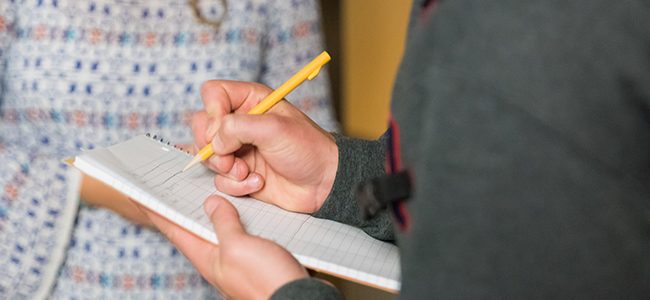Congratulations on being accepted to Gonzaga University! When you walk across the stage and receive your diploma, I know you will be glad that you chose to continue your educational journey at GU.
As we prepare for Spring semester of 2018, I urge you to take advantage of Orientation. It is designed to introduce you to the array of academic, professional, and personal support services available to you and to help you quickly and smoothly find a place amidst a cohort of fellow students and friends.
Gonzaga wants you to have ambitious aspirations for your time here and for your lives after graduation. Many of you know exactly what you intend to study. Others of you may still be exploring and discovering to what field your intellectual and professional passions might lead. Faculty and staff are dedicated to assisting you as you make choices and organize yourselves to achieve your goals, specifically through the Center for Student Academic Success, as well as your assigned academic advisor, and they are here to help!
The Center for Student Academic Success (CSAS) is a collaboration of departments providing all-inclusive academic support: Disability Access can establish accommodations and provide resources, Academic Advising and Assistance can be especially helpful with establishing and transitioning majors, and Learning Strategies can assist with developing effective organizational skills in this new world of college study. A tour of the CSAS is part of your orientation program on January 17th.
Your academic advisor is a faculty member or professional advisor who has been where you are – in the midst of the higher education journey. Your advisor knows things you need to learn about navigating university education at Gonzaga. Your advisor can put you in touch with offices on campus that can assist you in exploring your interests, help if you are having academic difficulty, and support you in making the transition from study to career. Your advisor can be a sounding board as you calibrate to the level of expectation and independence of thought expected at Gonzaga compared to that of other colleges or universities where you have studied. And, your advisor can engage you in conversation about or connect you with others who can assist you with your educational and career goals and ways to achieve them.
Here are some guidelines to help you get the most out of your advising relationship during your time at Gonzaga:
- If you have not done so already, meet with your academic advisor, whether that individual is a professional advisor in Academic Advising and Assistance, a staff advisor in a professional school, or an assigned faculty advisor. Make a list of questions to take with you to that first meeting.
- Become familiar with curriculum requirements and track your progress towards graduation. It is your responsibility as a student to know and comply with all GU academic policies, procedures, and deadlines. For transfer students this includes being on top of the forms that specify what of your previous coursework transfers towards the university core, your chosen college or school requirements, and major/minor requirements.
- Initiate regular contact with your academic advisor, minimally once per semester.
- Use advising sessions effectively: make appointments, arrive on time, bring needed materials, and ask specific questions.
- Take responsibility for decisions regarding your academic career and for your academic performance.
Gonzaga’s faculty and staff are here to work on your behalf. The mission of this university is to educate students to succeed and make a positive difference in the world. We want to support you. Let us be your partners on your educational journey.
Elisabeth Mermann-Jozwiak, Ph.D., is Gonzaga’s Interim Academic Vice President. She taught English at Texas A&M-Corpus Christi for nineteen years, and has previously served as Dean of the College of Arts and Sciences at Gonzaga.
